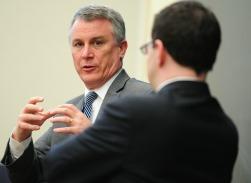Iran, Israel, and the United States: What's Next?
Columbia Law School Professor Matthew Waxman and Former National Security Council Senior Director Michael Doran Discuss U.S. Policy in the Middle East at Event Sponsored by Roger Hertog Program on Law and National Security
New York, April 16, 2014—Negotiations between the U.S. and its Western allies and Iran aren’t likely to persuade the Middle Eastern country to dismantle its nuclear program, according to Michael Doran, a senior fellow at the Brookings Institution and former senior director in the National Security Council under President George W. Bush, who spoke to Columbia Law School students and guests at an April 10 event.
Under the terms of an interim agreement between the sides, the West has lifted some sanctions and Iran has agreed to suspend some nuclear activities. Doran analyzed the ongoing negotiations and other Middle East policy issues in a far-ranging discussion with Columbia Law School Professor Matthew C. Waxman, faculty co-chair of the Roger Hertog Program on Law and National Security, which sponsored the event, “Iran, Israel, and the United States: What’s Next?” along with the National Security Law Society, a student group.
| Hertog Program guest and former National Security Council senior director Michael Doran in conversation with Columbia Law School Professor Matthew C. Waxman |
Waxman emphasized that no matter who is sitting in the Oval Office, questions about Middle East policy in general and Iran’s nuclear program in particular are difficult and complex.
“There are national security challenges a president knows he will face, and then there are surprise popups,” Waxman said in his introduction. “The Iran nuclear threat falls into the category of ‘predicted’ and will be one of the main foreign policy issues for which Obama’s presidency will be judged.”
Doran, the Roger Hertog Senior Fellow at the Saban Center for Middle East Policy, said he was an “extreme skeptic” about the negotiations.
“Iran is at first and goal with regard to developing nuclear weapon capability,” he said. “So what’s happening is, we are paying them—in the form of sanctions relief—to not run the play.”
Doran said the Obama administration and its allies never should have lifted the sanctions or the threat of military action.
“We’re only going to get what we want from them if we put them in front of a hard choice,” he said, noting that sanctions had brought Iran to the table in the first place.
Doran said he shares the Obama administration’s goals but does not agree with its processes.
“Our goal should be to try to prevent the day coming when the president has to decide: ‘either I bomb Iran, or Iran gets the bomb,’” he said. “We’re really trying to produce that third option.”
| Waxman asked Doran a wide range of questions on Middle East policy. |
Waxman asked Doran to comment on the view that the Obama administration lost credibility on its willingness to use military force in the region after it declined to strike in Syria.
“Nobody in the Middle East believes there’s a credible military threat against the Iranians,” Doran said. “None of our allies and none of our enemies.”
Doran said Israeli government leaders he has spoken to have lost faith in the negotiations but have to “pay deference” to them because of Israel’s dependence on the U.S. and other allies for security.
He said forgoing military action in Syrian in exchange for an agreement that President Bashar al-Assad would destroy his chemical weapons had not produced any meaningful effect on the continuing civil war. He said a better option would have been to build a coalition to support opposition fighters early on.
During a Q&A with audience members, one attendee questioned whether support for Syrian opposition fighters is wise, given that the U.S. can’t guarantee an outcome in such situations.
“We can’t control the outcome, but we absolutely can influence it,” Doran said. “We certainly have no control over the outcome if we’re doing nothing.”
| Students and guests participated in a Q&A with Doran and Waxman after the discussion. |



